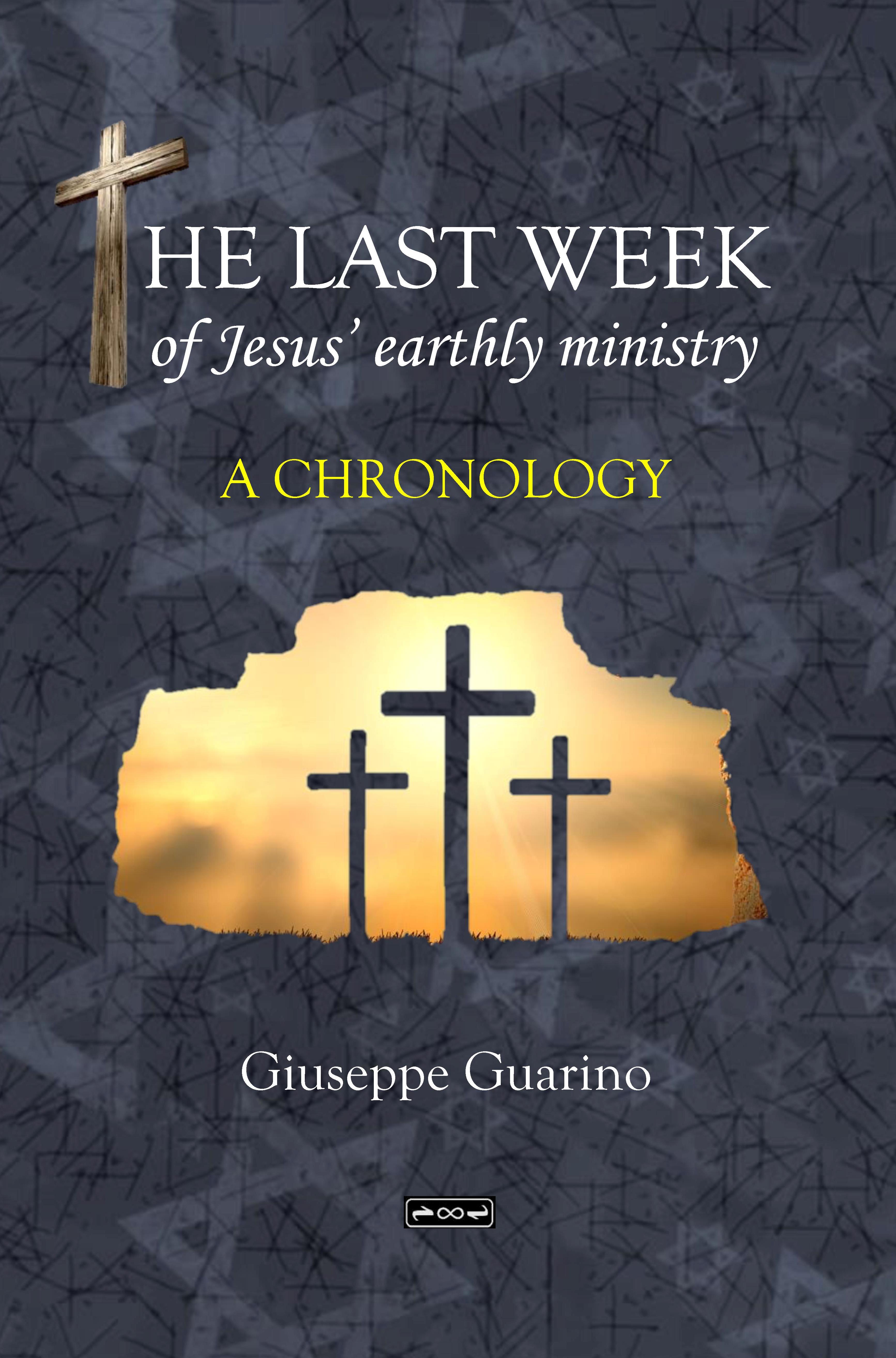After Three Days vs. The Third Day by Giuseppe Guarino
This study is taken from my soon to be released new book on Jesus’ Last Week.
 |
It will be available on Amazon October 15, 2023 |
“And He began to teach them that the Son of Man must suffer many things, and be rejected by the elders and chief priests and scribes, and be killed, and after three days rise again.” (Mark 8:31)
“Behold, we are going up to Jerusalem, and the Son of Man will be betrayed to the chief priests and to the scribes; and they will condemn Him to death and deliver Him to the Gentiles; and they will mock Him, and [e]scourge Him, and spit on Him, and kill Him. And the third day He will rise again.” (Mark 10:33-34)
It appears that the two expressions in the title and the preceding scriptures contradict each other.
They do not.
Individuals who speak multiple languages often encounter the challenge of being unable to translate a sentence literally or even explain its meaning in a foreign language.
I have been teaching English for many years, and since English contains far more idiomatic expressions than Italian, my students often find themselves facing significant challenges. They usually prefer to avoid using such expressions in their conversations because they are unfamiliar with our language’s peculiarities. None of my students have ever fully understood why, when it rains heavily in England, it’s said to be raining cats and dogs.
At times, languages reflect the mindset of their speakers, and, like a dog chasing its tail, languages can, in turn, shape the mindset of people. For instance, in America, people celebrate their “birthday,” whereas in Italy, we celebrate the “compleanno,” which translates to the completion of a year. It represents a completely different perspective on the same event. It’s amusing to hear some Italians discuss the idea that from the day you are born until your “compleanno,” you are considered one year old. Simultaneously, it would be impossible for an Italian to celebrate a “birth-week,” as some of my American friends have told me they do, because the completion of a year can only occur on the same day as one’s birth.
In my years of studying biblical Greek, I’ve observed the strong influence of the Jewish Semitic mind and languages, which has demonstrated that Greek alone cannot adequately convey the meaning of certain sentences or expressions found in the New Testament.
When confronted with a situation like this, I consider two simple facts. First, it is a mistake to underestimate the authors of the Bible. They were not uneducated or naive, as some critics of the Bible might depict them. They were educated, prepared, and guided by the Holy Spirit.
Second, when people speak of contradictions, they often lack sufficient knowledge of the Bible to make a convincing argument. Very few individuals have truly confounded me during my forty years as a Bible-believing Christian; many have merely made me smile.
For example, some critics attack the dates in the book of Daniel concerning the Babylonian kingdom, arguing that they contradict what we read in Jeremiah. However, there is no contradiction. Jeremiah was using an Egyptian time reckoning, while Daniel was using the Babylonian system.
So, which expression is correct: ‘three days and three nights’ or ‘on the third day’? Since Jesus actually rose on the third day, ‘the third day’ literally occurred. Consequently, since Mark found no contradiction between the two expressions and included both in his account, and since ‘three days and three nights’ has not literally occurred if we apply our Western interpretation to it, I conclude that ‘the third day’ must be taken literally, and ‘three days and three nights’ must be an idiomatic expression.
Now, let’s investigate the matter from a purely linguistic perspective because sometimes logic has little to do with languages. First, let’s consider the passage in Matthew 12:38-42 and its parallel in Luke 11:29-32.
Verse 40 says,
“For as Jonas was three days and three nights in the whale’s belly; so shall the Son of man be three days and three nights in the heart of the earth.”
Why doesn’t Luke mention this detail? Could it be that the expression was too Semitic for his Greek readers, who might have interpreted it literally and perceived a contradiction with what he says later?
“Then He took the twelve aside and said to them, “Behold, we are going up to Jerusalem, and all things that are written by the prophets concerning the Son of Man will be accomplished. For He will be delivered to the Gentiles and will be mocked and insulted and spit upon. They will scourge Him and kill Him. And the third day He will rise again.”” (Luke 18:31-33)
Matthew is the only one saying,
“And he came and dwelt in a city called Nazareth, that it might be fulfilled which was spoken by the prophets, “He shall be called a Nazarene.” (Matthew 2:23)
The only way to actually determine where this is written in the Old Testament is by understanding the Hebrew language and the spelling of the word ‘Nazarene’ in that language.
Then, you can reference it to Isaiah 11:1. If you read both passages in Hebrew, it becomes evident.
Isaiah 11:1,
ויצא חטר מגזע ישׁי ונצר משׁרשׁיו יפרה׃
Matthew 2:23,
וַיָּבֹא וַיֵּשֶׁב בָּעִיר הַנִּקְרֵאת נְצָרֶת לְמַלֹּאת אֶת־דִּבְרֵי הַנְּבִיאִים כִּי נָצְרִי יִקָּרֵא לוֹ׃
It is impossible to understand from the Greek or the translation alone. (If you want to know more, read my article Jesus, a Nazarene – www.giuseppeguarino.com)
Let’s consider a few more relevant details.
Matthew speaks of ‘three days and three nights,’ quoting Jonah. He is the only one who mentions this; Luke does not include it.
The expression ‘after three days,’ which might be thought to be similar to the preceding, is found in several places: Matthew 26:61, 27:40, 27:63, Mark 8:31, 14:58, 15:29, John 2:19.
The expression ‘the third day’ is found in: Matthew 16:21, 17:23, 20:19, 27:64, Mark 8:31, 10:34, Luke 9:22, 18:33, 24:7, 24:46, Acts 10:40.
Perhaps we can find the key to understanding the above expressions in 2 Chronicles 10:5.
So he said to them, “Come back to me after three days.” And the people departed.
A few verses later, 2 Chronicles 10:12 reads,
So Jeroboam and all the people came to Rehoboam on the third day, as the king had directed, saying, “Come back to me the third day.”
There are no contradictions in the book of Chronicles, nor in the Gospels. Rather, there exists a different way of reckoning time compared to our contemporary standards.
Another example can be found in the book of Esther (4:16) when compared to (5:1).
The fact that Jesus was crucified on Friday, the 15th of Nisan, and rose on Sunday, the 17th of Nisan, aligns perfectly with the prophetical interpretation of Exodus 12 and the authentic meaning of biblical expressions describing the duration of Jesus’ death and the day of His resurrection. This consistency is in harmony with Jewish customs, and it should come as no surprise. Any sense of strangeness or contradiction arises from limited knowledge rather than errors or inaccuracies in the Word of God.
Another noteworthy detail is that for us Westerners today, a day begins at 00:00 and ends at 23:59, as evidenced by our clocks, expensive wristwatches, and perfectly synchronized cell phones. However, it was not the case two thousand years ago in Israel. We must respect the differences that existed. This different situation implied an alternate approach to measuring time and a distinct linguistic response to it.
In the Jerusalem Talmud, Rabbi Eleazar ben Azariah stated, ‘A day and a night make an ‘onah,’ and a part of an ‘onah’ is as the whole.’ Thus, according to the Jewish perspective, the remaining part of Friday, Saturday, and the fraction of Sunday can be considered as three ‘onah.’
There is something I want to share with the reader. For centuries, people have attempted to prove the Bible wrong, mistaken, or contradictory. Yet, as facts have been correctly examined and new historical or linguistic discoveries have been made, all these attempts to discredit the Word of God have been proven wrong.
Why has the Bible become such a blessing for believers and a source of anger and hatred for those not interested in believing? The challenging content of the Word of God appears to leave little or no room for neutral ground.
However,
– If no one has successfully proven the Bible wrong thus far,
– If those who have believed in its message lead blessed lives filled with peace, joy, and security in the Lord’s promises,
Dear reader, if you have not done so already, wouldn’t it be wise to give God a chance by opening the Word, not to criticize or judge it, but to seek a change and breakthrough in your life? To try and restore the wonderful relationship with our God that sin may have disrupted?
I challenge you to give God an opportunity to reach you and offer salvation.


